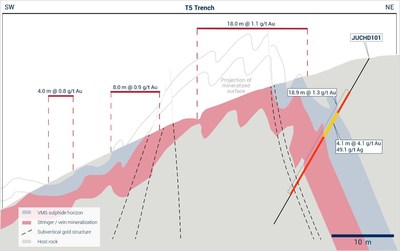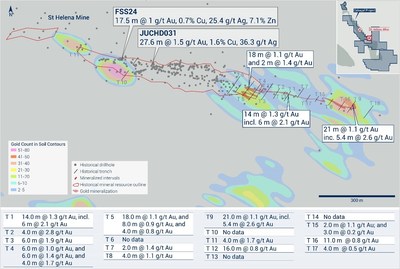/NOT FOR DISTRIBUTION TO U.S. NEWS WIRE
SERVICES OR FOR DISSEMINATION IN THE U.S./
Historical trenching and drilling results
combine to extend Santa Helena gold trend to 1.3 km
LONDON,
March 29, 2022 /CNW/ -
Meridian Mining UK S (TSXV: MNO), (Frankfurt/Tradegate: 2MM) & (OTCQB:
MRRDF), ("Meridian" or the "Company") is pleased to announce that
its ongoing review of historical data of the Santa Helena
copper-gold-silver-zinc VMS deposit ("Santa Helena")1,
has identified that the gold overprint extends over 1.3km in strike
and remains open. The historical Santa Helena mine is an advanced
prospect within the Company's camp scale copper-gold VMS Project
("Cabaçal") located in Mato Grosso,
Brazil. Near-surface historical diamond drill results,
located to the east of Santa Helena's pre-mining VMS resource,
returned 18.9m @1.3g/t Au from
6.3m and are coincident with surface
trench results of 18.0m @ 1.1 g/t Au
(Figure 1). The Company is continuing its evaluation of Santa
Helena as it sees this open gold trend and the under-lying Santa
Helena VMS mineralization (Figure 2), as having strong attributes
for open pit potential that would be incorporated into a larger
Cabaçal development scenario. Santa Helena field programs are
ongoing.
Highlights of today's announcement:
- Meridian identifies open, 1.3km gold trend at Cabaçal's Santa
Helena deposit;
- Meridian maps extensive gold over print of Santa Helena's
copper-gold-silver-zinc VMS deposit;
- Robust gold mineralization above VMS massive sulphides
confirmed by 1980's drill results;
-
- JUCHD-101 assays 18.9m @ 1.3g/t
Au from 6.3m;
Including
-
- 4.1m@ 4.1g/t Au & 49.1g/t Ag from 10.2m;
- Surface vertical structures align with down dip gold
mineralization;
- Historical trenching results map a continuous gold
structure;
-
- T5 assays 18.0m @ 1.1g/t
Au;
- T9 assays 21.1m @ 1.1g/t Au;
and
- Santa Helena fits Meridian's strategy of focusing on Cabaçal
copper-gold mine while developing high-grade satellite prospects
along the 11km Mine Corridor.
Dr Adrian McArthur, CEO and
President of Meridian, comments, "Meridian's ongoing field programs
and historical data reviews are continuing to strengthen our view
that Santa Helena represents a robust opportunity for a satellite
open pit project. The cross-section below indicates Santa Helena's
geology is very similar to that of the Cabaçal Mine's, with a
defined VMS envelope being overprinted by steeper gold-bearing
structures; something we also expect to see repeated along the
intermediate 9km of the Cabaçal Mine Corridor and potentially over
the entire Cabaçal camp. Significantly, Santa Helena's open surface
gold trend extends 350m beyond the
limits of its pre-mining resource envelope, which was focussed on
the underlying, but shallow, high-grade massive-sulphide
mineralization. These and other geochemical anomalies are open
100m past the last reported trench
results, while the lateral but parallel soil anomalies may
represent repeats of the gold overprint, all requiring following
up. With only part of the pre-mining resource extracted and
near-surface gold mineralization open and undeveloped, Santa Helena
has significant potential for an open-pit development program. The
Company will continue with its validation programs, applying the
same methodology as at the Cabaçal Mine to bring Santa Helena
towards an updated resource estimation in early 2023."

Figure 1. Santa Helena surface gold and JUCHD101 gold
intersections: structural style and mineralization.
Santa Helena Review
Santa Helena is the most advanced of several prospects along
Cabaçal's Mine Corridor. Santa Helena was partially mined between
2006 to 2008, with resource development and small-scale underground
mining focused at the time on the high-grade zinc-dominant massive
sulphide. The life of mine production was planned to run to 2011,
but the 2008 commodities price slump led to early termination of
the operation. Similar to the Cabaçal Mine's history, the gold
overprint and the full extent of the copper-gold-silver-zinc VMS
mineralized halo has remained largely untested since its discovery.
Despite Santa Helena's prospective grades and geometry, it was
never considered for open pit development. Meridian's immediate
focus is on developing the Cabaçal copper-gold mine, while
sustaining a medium-term program to develop the potential open pit
upside of multiple shallow copper-gold mineralized prospects
defined within the Mine Corridor; Santa Helena is the most advanced
deposit and is within a granted mining licence.
The Santa Helena deposit (historically also referred to as C2C,
and Monte Cristo), is located 9km to
the southeast of the Cabaçal Mine area, within the 11km Mine
Corridor trend. The deposit was first discovered by BP Minerals
(BPM) in 1984, following evaluation of surface soil
copper-lead-zinc-gold anomaly, which was found to be associated
with gossans enriched in gold and silver. BPM executed three local
campaigns of drilling between 1984 and 1989, totaling 100 holes for
10,975m of drilling. At least 17
trenches (735m) were also concluded
by BPM, supplementing the drilling results. Meridian's senior
geologist, Mr Antonio José de
Almeida, was heavily involved in the exploration campaign during
this phase. The deposit is associated with the same correlative
stratigraphic package as the Cabaçal Mine's; metamorphosed felsic
to intermediate volcanics, cherts, tuffaceous volcaniclastic rocks,
and gabbroic intrusives. The rocks exhibit a chloritic alteration
overprint associated with the VMS event. The mineralization is
localized in an east-south-easterly trending fold, with an overall
synformal geometry, cut by subvertical shears.

Figure 1. Santa Helena historical drilling, trenching, and
soil geochemistry. Santa Helena's underground resource outline is
shown, highlighting the broad footprint of gold mineralization to
the east and to the south.
The former operator at Santa Helena, Prometálica, completed 39
holes for 2479m between 1999 and 2001
and conducted development studies ahead of commissioning the
underground mine, with mine production commencing in October 2006. This drilling campaign was focused
on the main massive sulphide mineralization, with no sampling of
the drill cores for assays until an average down-hole depth of
33.0m. Gold assays are not available
for 12 of the holes, and for an additional nine of the holes, the
first recorded sample starts within the mineralized halo (grades of
0.1 – 1.0g/t Au). Assay sampling in the original BPM holes (for
which data is available in the JUCHD series), is similarly, with an
average starting depth of 22.4m.
Whilst some angled holes were drilled by BPM, historical drilling
was overwhelmingly vertical unsuited to vertical structures.
The advanced nature of Santa Helena, with a defined mineralized
envelope and known metallurgical flow sheet and mineral products,
means that it can be developed much faster and at a lower risk when
compared to more "early stage" but larger prospects located within
and outside of the Mine Corridor. This would allow it to be
incorporated into a conceptual Cabaçal development program
providing supplementary high-grade feed to a centralized mill
located at the Cabaçal Mine, while the greater Mine Corridor
provides the potential for Cabaçal's long-term scalability.
Notes
Historical BP Minerals samples from Santa Helena were
analysed with a three-acid digest for base metals with atomic
adsorption finish, aqua regia digest for silver with an atomic
absorption finish, and fire assay of a 50g charge for gold at the
Nomos laboratory in Rio de
Janeiro. Quality control measures included the use of
laboratory standards, blanks, duplicates, and umpire laboratory
checks. Samples from Prometálica underground drilling program were
analysed in their on-site mine laboratory (archival searches for
analytical protocols and QAQC are progressing).
The Company also announces that further to the Company's news
releases dated March 31, 2020,
April 27, 2020, and June 3, 2020, with respect to the Consolidated
Facility Agreement (the "Convertible Loan") between the Company and
Sentient Global Resources Fund IV, L.P. ("Sentient IV") which was
entered into at the time of the Company's financial restructuring
in April 2020, the Company intends to
issue 5,869,671 common shares to Sentient IV (the "Settlement
Shares") at a deemed price of C$2.50
per Settlement Share, in settlement of the debt owing to Sentient
IV, pursuant to the Convertible Loan. The Company is proposing to
issue the Settlement Shares to preserve cash to fund future
operations. The Settlement Shares will be issued on receipt
of TSX Venture Exchange approval and will be subject to a four
month and one day hold period.
On behalf of the Board of Directors of Meridian Mining UK S
Dr. Adrian McArthur
CEO, President and Director
Executive Chairman
Meridian Mining UK S
Stay up to date by subscribing for news alerts here:
https://meridianmining.co/subscribe/
Follow Meridian on Twitter:
https://twitter.com/MeridianMining
Further information can be found at www.meridianmining.co
ABOUT MERIDIAN
Meridian Mining UK S is focused on the acquisition, exploration,
and development activities in Brazil. The Company is currently focused on
resource development of the Cabaçal VMS Copper-Gold project,
exploration in the Jaurú & Araputanga Greenstone belts located
in the state of Mato Grosso;
exploring the Espigão polymetallic project and the Mirante da Serra
manganese project in the State of Rondônia Brazil.
FORWARD-LOOKING STATEMENTS
Some statements in this news release contain forward-looking
information or forward-looking statements for the purposes of
applicable securities laws. These statements include, among others,
statements with respect to the Company's plans for exploration,
development and exploitation of its properties and potential
mineralization. These statements address future events and
conditions and, as such, involve known and unknown risks,
uncertainties, and other factors, which may cause the actual
results, performance, or achievements to be materially different
from any future results, performance or achievements expressed or
implied by the statements. Such risk factors include, among others,
failure to obtain regulatory approvals, failure to complete
anticipated transactions, the timing and success of future
exploration and development activities, exploration and development
risks, title matters, inability to obtain any required third party
consents, operating risks and hazards, metal prices, political and
economic factors, competitive factors, general economic conditions,
relationships with strategic partners, governmental regulation and
supervision, seasonality, technological change, industry practices
and one-time events. In making the forward-looking statements, the
Company has applied several material assumptions including, but not
limited to, the assumptions that: (1) the proposed exploration,
development and exploitation of mineral projects will proceed as
planned; (2) market fundamentals will result in sustained metals
and minerals prices and (3) any additional financing needed will be
available on reasonable terms. The Company expressly disclaims any
intention or obligation to update or revise any forward-looking
statements whether as a result of new information, future events or
otherwise except as otherwise required by applicable securities
legislation.
The Company cautions that it has not completed any feasibility
studies on any of its mineral properties, and no mineral reserve
estimate or mineral resource estimate has been established.
Geophysical exploration targets are preliminary in nature and not
conclusive evidence of the likelihood of a mineral deposit.
The TSX Venture Exchange has neither approved nor disapproved
the contents of this news release. Neither TSX Venture Exchange nor
its Regulation Services Provider (as that term is defined in the
policies of the TSX Venture Exchange) accepts responsibility for
the adequacy or accuracy of this release.
|
1 See
Meridian news releases December 6, 2021 and February 7,
2022
|
SOURCE Meridian Mining UK Societas